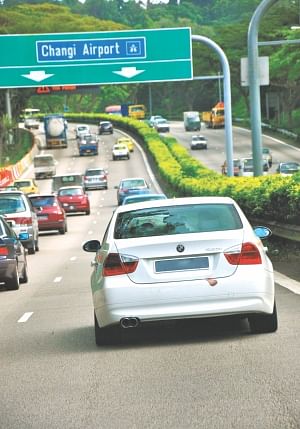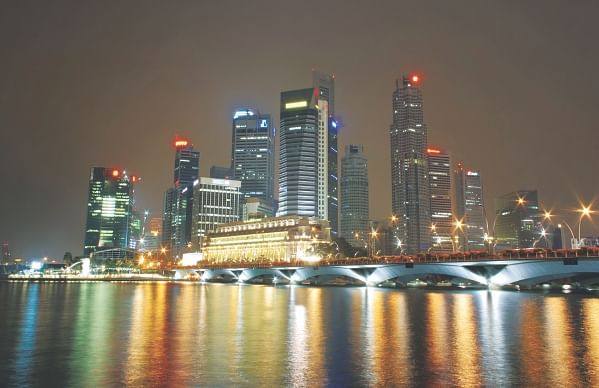| Home - Back Issues - The Team - Contact Us |
 |
| Volume 11 |Issue 05| February 03, 2012 | |
|
|
One Off Reflecting on Discipline or the Lack of It! Aly Zaker
Here at the Orchard Road, meandering through a weekday crowd, I was watching people on their brisk walk back from the day's work. I have been doing this chore ever since I had chanced uponthe opportunity to come to this city of Singapore sixteen years ago. And I must confess by looking at this crowd and by just watching its citizens on the streets I always thought of how vibrant a city can be. There is an anthropologist by the name of Mahmood Mandani. He had written a book titled "The Myth of Population Control" that I read years ago. While deliberating on the subject of population growth, he had once observed that the size of the population was perceived to be big or small, usually, by the quality of the population. He had said that a summer crowd at five-thirty in the afternoon at Piccadilly Circus, in London, would look much less intimidating than a crowd of a similar number at Connaught Circus in New Delhi at the same time simply because, in terms of look, dress and general health, the former looked healthier and thriving compared to the miserable looking latter. At least they did then when Mahmood wrote his book. He was obviously referring to equitable distribution of prosperity. I find a lot of meat in this argument. Even more when I see many more people on the boisterously busy roads of Singapore. Why? Because, lively and happy as they look, with the addition of a third factor called discipline, there seemed to be no problem with the number. Their high quality essentially was an add on to this perception. There they were this time as well. They were Chinese and Malays, Indians and Caucasians and of course a couple of Bangladeshis thrown in here and there. I really had nothing to do. Absolutely nothing. I hung around there, sometimes my back resting on the railing around the corners of the road. The road was full of traffic flowing in one direction. There were cars and buses and motorbikes. But there was no gridlock. They were moving, at whatever the speed, towards their destination. There was an element of respect to discipline that kept them rolling. At times it seemed boring. The roads in Singapore seemed to lack adventure like back home in Bangladesh. How about the motorbike riders merrily swerving away to the left and pavement pushing the walkers to the side wall or ditching them to the roadside drain? What if the cars or buses or the trucks went off the lanes meant for them and forked into all four lanes at will near the signals? What if they decided to blow their horns in a chorus, ignoring completely the code of conduct in a silent zone? If all these would happen there, things would have gone awry and Singapore would have ceased to be Singapore. But this element of discipline is not new in a place that celebrates 'control' of sorts. Many of us libertarians frown and mock at this covert dictatorship. But all of us would want to be there and be delightfully at home ensconced under the security blanket provided by the state.
I was once witnessing an interview programme where some young American journalists had confronted the legendary former Prime Minister of Singapore, Lee Kuan Yew, with some very poignant questions. One of them said, "did you know that your city was known as 'fine city'?” Lee had obviously understood the double meaning and said he did. The journalist said wasn't there any other way such transgressions could be addressed rather than imposing steep fines? Education could perhaps be a good way of orientating people? Lee answered that yes it was. But it'd take time. He wanted to see things happen in his life time. This element of urgency, I dare say, is what we need to contemplate upon. There are two driving forces to anything positive that can happen to a country. The first and foremost is the people’s participation and the second is the government initiative. In countries like ours where democracy is trying to get its root fortified, any direct initiative by the government may be cried down as dictatorial. Therefore, people will have to initiate such measures themselves. But when we see that on Dhaka streets people trash rules and behave most irresponsibly, we feel frustrated. Therefore, I suppose, there now is a crying need for forums where public interest can be engaged to form opinion in favour of civic senses and people's sensitivity towards the rule of law. Since the early 90s we have instituted a process of introducing democratic norms in our society. We now have people's representatives who congregate in the parliament and discuss issues relating to their regions. If a consensus on civility could be reached amongst these representatives and if they could carry the message of orderly behaviour to their respective constituencies, then they will have done a great service to themselves and to the nation. I do not see the possibility of the government coming down witha heavy hand to introduce disciplined behaviour. That will stir the hornets’ nest amongst the so called human rights activists, who cling on to any issue that does not please them. Since we cannot do anymore without a rule of law, and do away with the attitude of impunity towards lawlessness, dialogues must ensue. And these dialogues will have to happen in all levels of our society. The fact remains, who will start this engagement? This thought of apparent cynicism depressed me that evening at the Orchard Road in Singapore as I slowly walked back to my hotel.
Copyright
(R) thedailystar.net 2012 |
||||

